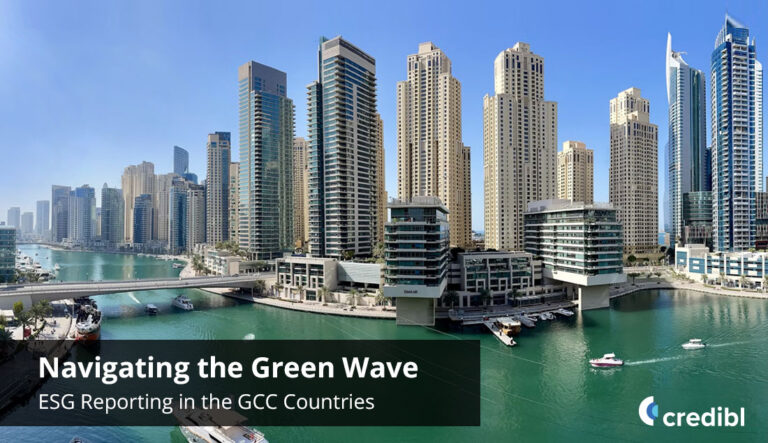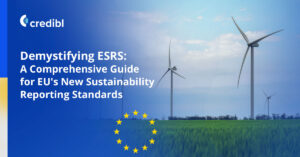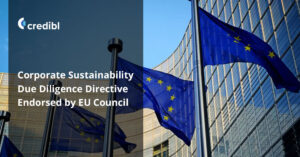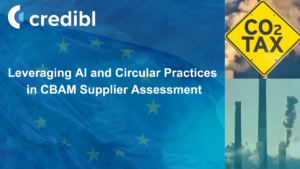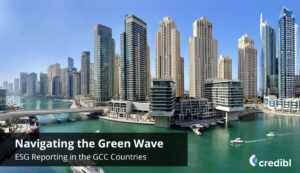Environmental, Social, and Governance (ESG) reporting is rapidly transforming the financial landscape globally, and the GCC region is no exception. As countries like Saudi Arabia and the UAE strive for economic diversification and sustainable development, ESG reporting has become crucial for transparency, attracting responsible investments, and promoting best practices.
History of ESG Reporting in the Middle East
The Middle East’s approach to corporate reporting has undergone a significant transformation in recent years. While financial metrics traditionally dominated the region’s focus, there’s been a remarkable shift towards sustainability and responsible practices. This growing emphasis has led to a surge in ESG reporting initiatives.
A Turning Point: The Rise of ESG Regulations
The global emphasis on sustainability, coupled with heightened investor interest in ESG factors, triggered a paradigm shift in the Middle East. Companies across the region began recognizing the long-term implications of ESG, both the potential risks and the associated opportunities. This recognition spurred several countries to implement ESG reporting requirements or guidelines.
Here are some key developments:
- Saudi Arabia: Tadawul (the Saudi Stock Exchange) launched sustainability disclosure guidelines in 2021, encouraging greater ESG reporting among listed companies.
- UAE: The Securities and Commodities Authority (SCA) made ESG reporting mandatory for listed companies in 2022, impacting over 130 entities.
- Bahrain: The Bahrain Bourse, in collaboration with the Central Bank of Bahrain, introduced voluntary ESG reporting guidelines in 2020.
- Qatar: The Qatar Stock Exchange issued ESG reporting guidelines in 2022.
- Kuwait: Boursa Kuwait released a voluntary ESG reporting guide for listed companies in 2021. Additionally, the Capital Markets Authority of Kuwait (CMA) implemented regulations in 2022 to promote sustainability within the financial sector.
- Oman: The Muscat Stock Exchange (MSX) introduced voluntary ESG disclosure guidelines in 2023, with mandatory sustainability reporting expected to be implemented by 2025.
Here’s a glimpse into the current state, bolstered by some compelling statistics:
- Regulation and Frameworks: While a unified GCC standard doesn’t exist yet, individual countries are taking the initiative. The UAE has issued mandatory ESG reporting guidelines for listed companies on its stock exchange (ADX). According to a 2023 report by PwC Middle East, 64% of respondents in the region reported having an ESG strategy in place, indicating a significant shift towards ESG integration.
- Market Demand: Investors are increasingly prioritizing ESG factors in their decisions. A 2022 survey by the Global Sustainable Investment Alliance (GSIA) revealed that global Sustainable Investment (SI) assets reached a record USD 38.2 trillion, a 34% increase from 2020. This highlights a growing global appetite for sustainable investments, and the GCC is well-positioned to attract these investors with strong ESG practices.
- Environmental Focus: The GCC countries, heavily reliant on hydrocarbons, recognize the need for environmental sustainability. Initiatives like Saudi Arabia’s Green Initiative ( ) with its target of planting 10 billion trees by 2030 demonstrate a commitment to environmental protection and a shift towards renewable energy sources.
Challenges and Opportunities for Middle Eastern Companies
The Middle East’s commitment to ESG reporting is undeniable, with several countries implementing regulations and guidelines. However, companies still face hurdles on their reporting journey.
Here’s a closer look at the key challenges:
- Regulatory Uncertainty
Unlike Western counterparts, companies lack harmonized and standardized reporting frameworks. This inconsistency creates confusion and compliance difficulties. A 2023 report highlights this lack of clarity, making it challenging to interpret and implement regulations. - Data Availability and Quality
Effective ESG reporting requires robust data infrastructure. Limited access to standardized and reliable data creates difficulties in accurately measuring and reporting performance. The lack of unified reporting metrics hinders companies’ ability to obtain accurate and comparable data. - Talent Gap and Internal Expertise
Implementing effective ESG practices requires qualified professionals and dedicated ESG teams. PwC’s 2023 Middle East report indicates that 41% of respondents consider the lack of internal skills as the biggest challenge in progressing their ESG strategy.
How companies can overcome these ESG challenges?
These challenges require cooperation from governments, regulators, and businesses. By addressing these gaps, Middle Eastern companies can not only comply with regulations but also emerge as sustainability leaders:
- Standardization: Collaborative efforts can lead to a unified reporting framework across the region, reducing confusion for companies operating in multiple markets.
- Data Infrastructure and Expertise: Investment in data infrastructure and fostering knowledge sharing can improve data quality and availability.
- Capacity Building: Implementing upskilling and training programs can equip professionals with the necessary expertise for effective ESG implementation.
In addition to the above steps, companies require an end-to-end ESG reporting platform to modernize their ESG practices with the following;
- Automate the Reporting Process
Manual data collection and analysis can be time-consuming and error-prone. Automating the process through a reliable reporting platform ensures accuracy and completeness in ESG reports. - Utilize ESG Reporting Software
Platforms like Credibl ESG provide tools for efficient data collection, management, and report generation. Choose software that aligns with global standards such as GRI, TCFD, and UNSDGs for relevant and compliant disclosure. - Prioritize Data Validation and Verification
Ensure the accuracy and reliability of ESG data with robust validation and verification practices. Implement clear data collection procedures and consider independent verification to add credibility to your report. - Foster a Culture of Continuous Improvement
The ESG reporting process should involve regular reviews and feedback from stakeholders to identify areas for improvement. Stay updated with evolving regulations and best practices to maintain high-quality reporting.
The Road Ahead for ESG Reporting
Challenges exist, but the opportunities presented by ESG reporting are significant. By overcoming these hurdles through collaboration on standardized frameworks, data infrastructure investment, and knowledge sharing, GCC countries can solidify their position as leaders in sustainable finance.
Here are some potential benefits, along with some impactful statistics to consider:
- Enhanced Transparency and Accountability: Clear ESG reporting builds trust with investors and stakeholders. A 2020 study by MSCI found that companies with strong ESG ratings outperformed those with weak ratings over the long term.
- Reduced Risks and Improved Efficiency: Proactive ESG management mitigates environmental and social risks, leading to cost savings and operational efficiency. According to a 2020 McKinsey report, companies with strong ESG practices have been shown to generate superior financial performance.
- Attracting Sustainable Investments: Strong ESG practices unlock access to a growing pool of environmentally and socially conscious investors. As mentioned earlier, global Sustainable Investment (SI) assets reached a record USD 38.2 trillion in 2022, highlighting the vast potential for companies with robust ESG credentials.
- Building a Greener Future: ESG reporting plays a vital role in promoting responsible business practices and contributing to the region’s long-term sustainability goals. The GCC’s environmental initiatives, like Saudi Arabia’s Green Initiative, demonstrate a commitment to a sustainable future, and ESG reporting can significantly accelerate progress in achieving these goals.
Conclusion
The GCC stands at a critical juncture in its ESG journey, poised to unlock a future of sustainable growth, attract responsible investments, and contribute to a greener global economy by embracing ESG reporting and addressing current challenges. As highlighted by Consultancy ME, “The GCC is advancing on ESG, but much work still needs to be done.” There is a collective effort underway, promising a brighter future for sustainable development in the GCC.
With continued progress toward integrating sustainability into corporate governance, the GCC can enhance its ESG reporting practices and play a pivotal role in fostering a more sustainable and responsible future. It is imperative for companies in the region to remain proactive, committed to transparency, and dedicated to sustainability as they advance on their ESG journey.
To learn more about ESG advisory, consulting, and reporting, please schedule a call with our ESG expert.


